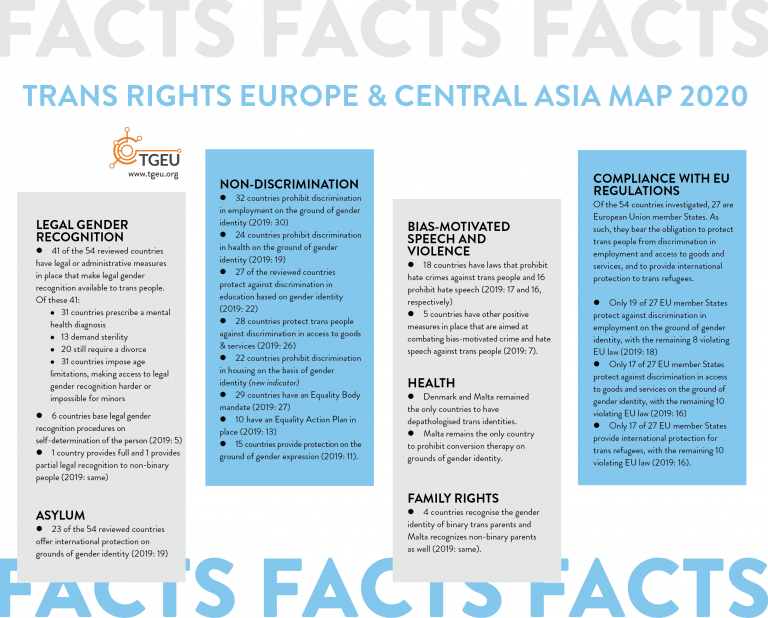Trans Rights Europe & Central Asia Index & Maps 2020
The Trans Rights Europe & Central Asia Index provides detailed information on the legal situation of all 47 Council of Europe member States and five Central Asian countries. The Index covers a total of 30 indicators in six legal categories: legal gender recognition, asylum, bias-motivated speech and violence, non-discrimination, health, and family.
The Trans Rights Europe & Central Asia Maps focus specifically on two legal gender recognition (LGR) indicators that stigmatise and violate the rights of trans people: forced sterilisation and mandatory mental health diagnosis. Each of the respective maps illustrates which countries demand these problematic LGR requirements.
Collectively, the Trans Rights Europe & Central Asia Index & Maps reflect the current legal situation in countries throughout the region based on consultation from in-country experts as of 10 May 2020. Please note the Index and related maps do not claim to exhaustively portray the complex legal and social contexts that trans people live in.
Legal Gender Recognition (LGR)
41 of the 54 reviewed countries have legal or administrative measures in place that make legal gender recognition available to trans people. Of these 41:
31 countries prescribe a mental health diagnosis
13 demand sterility
20 still require a divorce
31 countries impose age limitations, making access to legal gender recognition harder or impossible for minors
6 countries base legal gender recognition procedures on self-determination of the person (2019: 5)
1 country provides full and 1 provides partial legal recognition to non-binary people (2019: same)
Asylum
23 of the 54 reviewed countries offer international protection on grounds of gender identity (2019: 19)
Non-Discrimination
32 countries prohibit discrimination in employment on the ground of gender identity (2019: 30)
24 countries prohibit discrimination in health on the ground of gender identity (2019: 19)
27 of the reviewed countries protect against discrimination in education based on gender identity (2019: 22)
28 countries protect trans people against discrimination in access to goods & services (2019: 26)
22 countries prohibit discrimination in housing on the basis of gender identity (new indicator)
29 countries have an Equality Body mandate (2019: 27)
10 have an Equality Action Plan in place (2019: 13)
15 countries provide protection on the ground of gender expression (2019: 11).
Bias-motivated speech and violence
18 countries have laws that prohibit hate crimes against trans people and 16 prohibit hate speech (2019: 17 and 16, respectively)
5 countries have other positive measures in place that are aimed at combating bias-motivated crime and hate speech against trans people (2019: 7).
Health
Denmark and Malta remained the only countries to have depathologised trans identities.
Malta remains the only country to prohibit conversion therapy on grounds of gender identity.
Family
4 countries recognise the gender identity of binary trans parents and Malta recognizes non-binary parents as well (2019: same).
Compliance with EU regulations
Of the 54 countries investigated, 27 are European Union member States. As such, they bear the obligation to protect trans people from discrimination in employment and access to goods and services, and to provide international protection to trans refugees.
Only 19 of 27 EU member States protect against discrimination in employment on the ground of gender identity, with the remaining 8 violating EU law (2019: 18)
Only 17 of 27 EU member States protect against discrimination in access to goods and services on the ground of gender identity, with the remaining 10 violating EU law (2019: 16)
Only 17 of 27 EU member States provide international protection for trans refugees, with the remaining 10 violating EU law (2019: 16).

